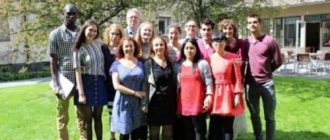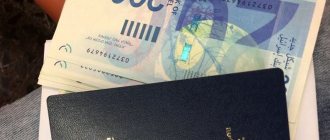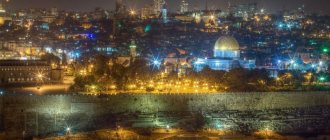Study abroad Education systems abroad Education system in Israel
- Types of education in Israel
- Educational degrees in Israel
- Video about the education system in Israel
- Preschool education
- Features of school education
- Repatriates
- Schools with Russian language of instruction
- Higher education
- Admission to university
- Education for Russians in Israel
- Postgraduate education
- Diploma confirmation
Israel's education system corresponds to the country's chosen course - the movement towards a post-industrial society. Investments and expenses on education are only growing, vocational training and advanced training are in demand. Employment in leading companies in the world is a common thing for a graduate of any Israeli university due to the flexibility, thoughtfulness and high quality of the state’s educational system.
Types of education in Israel
There are three types of education in this state:
- state. Studying in Israel is carried out according to the methods and programs approved by the Ministry of Education;
- state-religious. In addition to compulsory educational programs, 40% of the time is devoted to religious subjects;
- independent. These are educational schools for the study of Torah, some of them are not controlled by the government, some are funded by the state.
The best schools in Israel for repatriates
Children who graduated from prestigious schools have a much better chance of success than those who lived and studied in disadvantaged areas. The more elite the area of residence, the more likely it is that the schools in its territory will be in the upper echelons of the ranking.
The rating of Israeli schools takes into account the achievements of students, the degree of comfort of their stay at school and other parameters. The leading positions are occupied by schools from Herzliya, Raanana, Ramat Hasharon, Savyon, Hulon, and Tel Aviv. Among the outsiders are educational institutions from Acre, Beersheba, and Yeruham.
You can learn more about the school of any locality in Israel on the map prepared by the Ministry of Education (). For example, according to the ministry, the best schools in Rishon LeZion are:
- “Adini” (Nave Adarim district);
- “Merhavim” (western Rishon);
- combined middle-high school in Ma'arav Havatik;
- Gymnasium “Gan-Khanum”;
- “Katsenelson” (Holon);
- “Nir-ha-Emek” is a boarding school in the youth village of VIZO (Jezreel Valley).
For repatriates living in the southern regions of the country, an interesting option would be the interregional school “Maale Shaharut” (40 km from Eilat), which serves residents of 11 kibbutzim.
For children interested in theater, we can recommend the Yitzhak Rabin School of Arts and Sciences in Nahariya, with additional Hebrew classes for repatriates.
The most popular and well-known high schools often have “pnimii” - boarding schools where schoolchildren from remote areas of the country can live and study. So, in Jerusalem this is Boyer High School.
Preschool education
For children under three years of age, there are nurseries and kindergartens run by the Ministry of Industry. Older children (up to 5 years old) can be sent to special municipal kindergartens (trom-khova). In them, educators prefer game-based learning, and teachers and psychologists prepare children for further school everyday life. Preschool education in Israel is structured in such a way that children already learn to read and write at the age of five. While studying in preparatory groups, they become familiar with mathematics, basic knowledge about nature, and state and religious dates.
Procedure for admission of foreigners to universities in Israel
Israeli universities and colleges are open to citizens of other countries. Almost every university has programs for teaching them in English and Hebrew. In addition, many educational institutions are taught by immigrants from Russia, who give part of their lectures in Russian.
Israeli universities attract applicants from all over the world
All applicants to Israeli universities must know Hebrew at least at an intermediate level. You can learn it in a special educational center - ulpan. Moreover, you don’t have to go to Israel to do this; there are ulpans in Russia. They are usually opened at Jewish cultural centers. The intensive Hebrew course will take approximately 7–8 weeks.
Israeli secondary education is significantly different from Russian, so graduates of our schools need to complete additional courses lasting from 7 to 12 months. In them, future applicants study specialized subjects, English, Hebrew and the history of Israel. Particular attention is paid to preparing for the psychometric test. After completing classes, exams are taken, the results of which are taken into account when entering the university.
After receiving a certificate of completion of the preparatory courses and passing the psychometric test, foreign applicants can submit documents to the chosen university. Each university has its own registration procedure. As a rule, admissions committees send all the necessary forms in response to a request sent by mail. The applicant can only fill them out and send them back along with the education document. Applying to an Israeli university costs 250 shekels. A receipt for payment must also be attached to the package of documents.
Young people who are already students at Russian universities can transfer to an Israeli university. To do this, you will need to provide documents to the Department of Assessments and Verification of Degrees and Diplomas of the Israeli Ministry of Education. After receiving his permission, you must pass exams confirming your knowledge of English and Hebrew.
Most foreign students begin their studies in the first year. Some universities count those subjects that were passed with excellent marks.
Video: about studying and working in Israel
Applying for a student visa
After receiving confirmation of enrollment in any educational institution, you must contact the Israeli consulate to obtain a student visa, which gives the right to stay in the country for more than 90 days. There is an agreement between Russia and Israel on a simplified entry procedure, so its applicants will need a minimum of documents. These include:
- a completed application form, which can be downloaded on the website of the Israeli Embassy (https://urlid.ru/ad9p);
- two photographs measuring 5 by 5 cm;
- certificate of enrollment in an Israeli university;
- a document confirming the availability of funds to pay for study and living in the country;
- receipt of payment of the consular fee.
All documents must be translated into Hebrew and certified by a notary.
Features of school education
The three types of education that have already been mentioned fully apply to school education. However, it is worth noting that there is no single approved curriculum in Israel for all schools. Educational institutions are free to choose their own teaching methods and means, although they are under government control. As in Russia, school education in Israel begins at the age of 6 and is divided into three stages:
- primary - from the first (“alef”) to the sixth (“vav”) grade;
- incomplete secondary or intermediate - from the seventh grade (“zain”) to the ninth (“het”). The age of the students is from 12 to 15 years;
- secondary - from the tenth (“Yud”) to the twelfth (“Yud-Bet”) grade. As a result, children finish school at 18 years old.
Throughout high school, holidays fall on Jewish holidays (except summer).
The study of Hebrew in Israel begins in elementary school. There is no homework from grades 1 to 6; it is believed that first you need to learn to simply remember the essence of what the teacher teaches.
In public schools, 75% of the subjects are compulsory, these are standard mathematics, history, English, computer science, geography, and Jewish studies. The remaining 25% are selected by the educational council. In state-religious schools, increased attention is paid to compliance with norms in behavior and dress. Religious studies and Judaic studies, reading prayers and the Bible come to the fore.
Parents can send their children to paid clubs: drama, vocational and technical.
In intermediate schools, students begin to be divided into groups based on academic performance and ability. Children are being prepared for secondary school, and the requirements for their academic performance are increasing. Depending on the abilities of the students, subjects in groups are taught at different levels.
Complete secondary school differs from incomplete secondary school in that it prepares students for admission to universities, after which they issue a matriculation certificate, or “bagrut”. To obtain it, you need to pass the State Graduation Exam, which not all schoolchildren can pass.
There are also vocational high schools in Israel, where children from 15 to 18 years old can study, preparing for a specific profession. There are also agricultural schools, military academies and "yeshivas" - boarding schools for religious education. Some of the vocational schools have a 13th and 14th grade specifically for junior engineer or technician training.
In Israeli schools, a five-point system is used; in the 11th grade, the division into profiles begins: scientific, humanitarian or technical.
How does the Israeli educational system work?
The country's education system is developing according to the course chosen by the government, so investment and spending in this area is constantly growing. And, since university graduates who received higher education in Israel are in demand in many global companies, problems with employment usually do not arise.
Three main directions in education are most developed here:
- state: schoolchildren and applicants are trained according to the methods and programs that have been developed and approved by the Ministry of Education;
- with a religious bias: in an educational institution, about 40% of academic time is allocated to the study of religion;
- independent: special schools for Torah study.
Just like in other countries, Israel has adopted a three-level education system.
Teaching kids
Maternity leave in the country is only six months, so mothers are sent either to a nursery (here they are called maon) or to moshpakhton (family kindergarten). Preschool education in public and private kindergartens costs approximately the same, and will cost parents 1,500 shekels, which is approximately 28,000 rubles.
Discounts are provided for repatriates and parents with low incomes. Children
It is not customary to force anyone to do anything; they are given freedom, three meals a day and naps during the day. When a child reaches three years of age, he is sent to Gan Trom-Khova, a municipal kindergarten, where children stay for the first half of the day, without eating or sleeping. But this service costs 600 shekels, and repatriates pay only a sixth of the amount.
By the way, kindergartens are organized for single mothers on a charity basis, which are much cheaper, and they look after children there all day long. All children are required to study in the school preparation group, free of charge; they are taught to write, read and count.
More to read:
What is the average monthly salary in Israel?
Where is it possible to obtain citizenship when purchasing real estate?
Israel Schools
Although school education is controlled by the Israeli government, however, each educational institution chooses the methodology and programs for teaching children. Education in Israel begins at the age of six, they finish school at the age of 18, and go through three periods:
- Primary (1st - 6th grade).
- Intermediate (7th - 9th grade).
- Secondary (10th - 12th grade).
It is interesting that almost all holidays, excluding summer, in Israeli schools always fall on Jewish holidays, and homework is not given until the sixth grade. In elementary school, children study Hebrew and learn to simply understand and remember what the teacher says.
Three quarters of all subjects are traditional sciences: mathematics, geography, English, history and others. Each school chooses the remaining 25% independently. Religious schools devote a lot of time to Judaic studies and reading prayers. In addition, they strictly monitor the behavior and appearance of students.
Higher education
The best universities in Israel are:
- Hebrew University of Jerusalem;
- Israeli Technion (Polytechnic Institute);
- Tel Aviv University:
- University of Haifa;
- Open University of Israel.
They all have their own characteristics and specific training. For example, the country's oldest Jewish University was founded in the early 20th century, and is located near the holy sites of Jerusalem, which, according to authorities, helps students take their studies more seriously.
Before enrolling at a university in Israel, prospective students undergo psychometric testing, which is designed to test logic, knowledge of the English language, and aptitude for mathematics. The test is conducted in several languages, including Russian, this ensures a fairly high level of education for applicants from different countries.
Tuition fees at universities average 10,000 shekels per year, and for low-income students there is the possibility of low-interest loans. And the Open University in Tel Aviv makes it possible to get a free education in Israel, since they are admitted there without exams, and you can study by correspondence.
Repatriates
There is special education in Israel for repatriates - Jews who returned to their homeland. They have the right to financial assistance from the state, easier exams and simplified training. Repatriates also take additional classes in Hebrew or subjects related to this language. Classes are often organized for them to help children adapt.
For high school students, there are special Naale schools in Israel, where education is free, and the state also funds accommodation and food for repatriates. These are three-year schools available to teenagers who have already completed 9th or 10th grade. The main goal is to obtain a matriculation certificate, which is what the curriculum with an intensive Hebrew course is designed for, as well as familiarization with Jewish national values. The student is free to choose subjects depending on his preferences and inclinations.
Psychometric test for admission
Absolutely all Israeli applicants must pass a psychometric test to be admitted to educational institutions. It is usually assessed on a scale from 200 to 800 points. The passing score is usually 400.
The test assesses verbal, quantitative reasoning, and proficiency in English and Hebrew. The test is conducted in Hebrew, English, Russian, Arabic, French and other languages. This selection method has been used in Jewish educational institutions for a long time. Experience shows that the more points a person scores, the better he will graduate from university.
Schools with Russian language of instruction
Russian schools are quite well represented in Israel; they begin to study at the age of 4, despite paid education (it is cheap and accessible to everyone). Anyone can sign up there, but it’s good if the student knows how to speak basic Russian. As a rule, children of new repatriates study in such schools. In addition to the Russian language and literature, these schools teach mathematics, music, and delight children with educational games.
Schools in Israel: typology and features
Israeli legislation recognizes several types of school institutions in accordance with the degree of government control over their activities:
- public schools (secular) - educates about 70% of all children in the country (the first secular school in Israel was PIKA in Petah Tikva). Control over their activities is exercised by the Israeli Ministry of Education: 75% of all subjects are taught according to the ministry’s programs, and 25% at the discretion of the schools themselves. The average number of students in classes is up to 40 people;
- state-religious. In religious Zionist schools (25% of students) religious subjects are taught to a greater extent, the teaching staff in them are Jews;
- Orthodox schools - about 4% of children. Religious items predominate here.
Public schools are free, but private schools in Israel are paid. Parents must provide the child with textbooks, stationery and clothing.
Every year, the Ministry of Education calculates the amount of a one-time monetary contribution from parents to the “culture basket” - to pay for excursions, exhibitions and other events that schoolchildren attend (900-1100 shekels). New repatriates and low-income people receive a 98% discount.
In Israel there are also public special schools (arts, technology, science and others) with parental participation in tuition fees. In such schools the curriculum is broader than the ministerial one.
There are also foreign and private schools in the country (for example, the Leo Bek school in Haifa), which are recognized by the Ministry of Education, follow mainly ministerial programs, but teach a number of subjects in an expanded scope, often using their own teaching methods.
In many of these schools, teaching is conducted in English. Training in them, as a rule, is paid. For example, at the Even Yehude school near Netanya, the curriculum in which is based on the American one, has the highest tuition fees in the country: 95-103 thousand shekels per year. But after graduation, a diploma will allow you to enter universities in the USA and Europe.
In Israel, unique educational methods are actively used - the Montessori system, Waldorf methods, gene flow, TALI education.
In 1991, due to the increase in immigrants from the former USSR, the American School was created in Israel, under the patronage of which today there are 15 elementary and 10 high schools with a religious bias. Funding from the United States and free meals for children attract children from low-income families.
The Israeli government, together with the Jewish Agency, developed the “NAALE 16” program - “Children immigrate before their parents”, which provided an opportunity for foreign students eligible for repatriation to complete their secondary education and receive a certificate in Israel at the schools “Adassim”, “Yoanna”, “ Kfar” “Galim” and others.). More information can be obtained on the websites of schools (for example, “Mevoot Iron” -).
In addition to secondary education, enrolling in Technion classes will allow you to receive a first-degree engineering degree after school (for example, in Nakhalyali) and enter a technical university.
Interesting fact. In Israel, schools are not numbered. Each has its own name - after the name of a famous figure or the name of a street. School students must wear plain T-shirts with the emblem (semel) of the school - this is the school uniform in Israel. Emblems can be stamped for free in the store when purchasing clothes, or printed on a T-shirt you bring for 7 shekels.
Higher education
Three-level higher education in Israel is slightly different from the usual Russian system:
- Bachelor's degree – 3 years at universities. Colleges in Israel provide 4 years of education;
- Master's degree lasts 2 or 3 years;
- doctoral studies An analogue of Russian graduate school. The period of study depends on the university. It takes from 2 to 4 years to prepare and defend a doctoral thesis.
Israeli colleges are designed for mastering technical specialties, and many students go there to gain practical knowledge and then apply it in practice. In this country they have a more prestigious status than in Russia.
Now in Israel you can enroll in one of nine universities, each of which has its own characteristics. For example, the Hebrew University, located in Jerusalem, is considered the oldest and oldest prestigious university in the country. Both humanists and representatives of technical specialties can feel comfortable here. Tel Aviv University is more focused on economic and social sciences. It is also known for engineering students, as is the Technion in Haifa, home to Google's research centers.
Universities in Israel
Hebrew University
The university located in Jerusalem is the best educational institution in Israel and the largest scientific center in the country. The Hebrew University has faculties covering all scientific fields, the best among which are considered to be mathematics, economics and the faculty of humanities. The annual number of applicants is more than 20,000.
Technion
In 1925, the Israel Technical Institute was opened in Haifa. The main specializations of the university are civil engineering, exact and technical sciences. Each year, the university awards the Harvey Prize to students who have achieved outstanding achievements in medical, science or humanities research. At the beginning of the academic year, more than 13,000 applicants enter the Technion faculties.
Institute named after Weizmann
The only university in Israel that accepts students with a bachelor's degree. The Weizmann Institute specializes in the study of mathematics, physics, chemistry, biology and brain research. Every year, about 1,000 qualified specialists graduate from the university.
Israeli citizens pay 50% of the cost provided for foreigners for studying at universities. The rest is compensated by the state. Repatriates have the right to receive additional financial assistance for training. The amount of required payment for education depends on the university and its location. On average, for foreigners, studying at Israeli universities costs $7,000 per year. Master's programs cost between $3,800 and $14,800 per year.
Accommodation in a student dormitory will cost approximately $500 per month. Apartment rent costs up to $750 per month. Repatriates receive benefits for living expenses from the Ministry of Construction. About $600 per month will be required for transportation and gastronomic expenses. Mandatory fees include security payments, insurance and Student Union registration fees of nearly $2,000 per year.
Admission to university
To become a student at any university, you need a certificate confirming completion of high school, knowledge of Hebrew, English and passing a psychometric test. It tests your ability to think logically and mathematically, as well as your ability to speak English. For exact or natural sciences, a mathematics exam is taken, and there may also be additional tests in specialized disciplines. An interview or writing of creative works is possible, which is more relevant to humanitarian specialties. The cost of studying in Israel varies from 2.5 to 3 thousand dollars per year, regardless of the university and faculty, this does not take into account the costs of housing, office, etc.
Cost of education
Studying in Israel is far from a cheap pleasure. An important feature of Israeli education is that international students always pay 25% more than local Israelis.
Of course, the cost of training varies depending on the chosen educational institution and faculty. Thus, a bachelor's student at a large educational institution in Israel will pay about 400 thousand rubles or 30 thousand shekels for two semesters or one academic year.
In less prestigious universities located in provincial parts of the state, the cost of training will be much lower, approximately 130 thousand rubles or 10 thousand shekels.
Those students who wish to continue their studies further and take a master's degree will pay a little more for it than for a bachelor's degree. Again, it all depends on the university and the chosen specialty.
The minimum cost will be about 180 thousand rubles or 14 thousand shekels. In prestigious higher educational institutions, the maximum cost of studying for a master's degree will be almost 660 thousand rubles or 50 thousand shekels.
Education for Russians in Israel
For Russians, studying in Israel at the faculty of any of the nine universities is quite possible; they only need to complete a one-year training course called “SELA”. Future students are taught Hebrew and the necessary disciplines for studying at the university. Exams required for admission:
- Hebrew;
- English;
- mathematics;
- logics;
- passing a psychometric test.
Please note that medical education in Israel is not available to foreigners.
Education for Russians, as for any foreigners, is paid. However, they do not feel completely abroad there, since 40% of teachers at any university speak Russian, and many subjects are taught in it not only in universities, but sometimes also in preparatory courses. And this happens despite the fact that the national languages of Israel are Hebrew and Arabic.
Recommendations
Those who decide to get an education in Israel must think through everything carefully, prepare well and take it responsibly.
Here are some recommendations to help you stay on your chosen path:
- Considering that there is no visa regime between Russia and Israel for a long time, you will still need a visa to get an education. But before you start applying for a visa, you need to submit documents to the university, pass exams and enroll. Only then will you need to contact the coordinator with a request to collect all the necessary documents for a visa;
- While studying in Israel, you will need an A-2 student visa, which will need to be renewed once every year. Information on obtaining a student visa can be found on the consulate website;
- If you decide to find work in Israel, you will have to change your student visa to a work visa of type B-1. The fact is that an A-2 visa does not give the right to work in the territory of another state;
- For Russians who want to move to Israel for permanent residence, studying at local educational institutions will only work to their advantage. It is easier for students to obtain Israeli citizenship, and with its acquisition you will be able to enjoy all the benefits of local citizens.
Israeli education gives many young professionals a chance to work in prestigious and leading companies, to be true professionals. It’s not for nothing that he is considered one of the best in the world.
In this video you will learn about the financing of science and education in Israel:
Diploma confirmation
This is the first step towards finding a job, but should not be confused with obtaining a permit. Confirmation of a diploma in Israel is done by the Ministry of Education. The procedure takes approximately three to four weeks, after which you can receive a certificate of academic degree and confirmation of diploma, which is previously notarized along with the insert.
The education system in Israel is optimal for those who want to get a decent job after graduation and at the same time gain comprehensive knowledge in many disciplines. It is also an excellent way to immerse yourself in the thousand-year history of the country, its laws and customs, and learn the Holy Scriptures. Receiving a higher education in Israel is an honor for any person; both the exact sciences and the humanities are valued in the state.
Translation and confirmation of educational documents
The process of confirming academic degrees and diplomas takes on average about 6 months. The possibility of obtaining a license in the specialty studied can be checked using a special electronic form on the website of the Department for the Evaluation of Academic Degrees and Diplomas. To confirm a certificate of completed higher education, you must fill out an application and submit it to the branch of the Ministry of Education along with the following documents:
Translated and notarized copy of the diploma
A certified copy of the work book (if available)
A translated and notarized copy of the attestation sheet
A copy of the marriage certificate and notarial application (if changing surname)
A certificate confirming the diploma is sent to the applicant by mail. The Ministry of Education does not consider certificates of incomplete education. The verification process should begin immediately upon arrival in Israel, as evidence of higher education or experience affects the employee's salary level.
Entry requirements for Russian students
Russian citizens can also enroll in an Israeli university. (The exception is medical professions.) To do this, you must complete a year-long SELA training program. Those interested, as in the case of the NAALE teenage program, must be at least a little Jewish and have a high school diploma. In addition to the psychometric test, they take exams in English, logic, and mathematics. Arriving in Israel, young people study Hebrew for the first five months (28 hours a week), then they are prepared to enter a university.
While studying, room and board are paid, and 250 shekels (approximately $40) are given each month for pocket expenses. Successful graduates of the SELA program must decide whether or not to take Israeli citizenship. If the answer is positive, they fall under the repatriation assistance program - the state lends them part of the money for settling in and studying. After the SELA program, young people must study for another year in college or at the preparatory department of a university (the so-called mekhina).
Studying in Israeli schools
One of the differences between Israeli schools and Russian ones is the possibility of choosing 25% of subjects individually on the school council, except for the program approved by the state. Each institution has the right to independently prescribe those methods and means of teaching that it considers necessary.
Basic subjects - mathematics, English, history, geography, computer science, Judaic studies - are required in public educational institutions.
Children are assigned to classes according to their level of knowledge. Primary school students are not given homework; their goal is to learn to remember what is taught in class.
In high school, students receive complete secondary education and a certificate of maturity - “bagrut”. Specialized schools in Israel can begin with a “hativa” (middle school) or a “tikhon” (high school).
They are of the following types:
- general education (academic), wide profile;
- professional;
- agricultural;
- military;
- arts;
- science and technology;
- religious – “yeshiva”, boarding type.
To receive a “bagrut”, which gives the right to enter a university, students take a final state exam in compulsory subjects.
Studying in Israel for Russian children has its own characteristics. There are Russian language schools here: all of them are private and are an evening institution in addition to the usual Hebrew educational institution.
Higher education institutions in Israel
Tel Aviv University is one of the leaders in Israeli higher education and a major scientific center. The university includes more than a hundred research institutes, schools and other departments.
The university includes the renowned Wise Observatory; Thanks to the comfortable astronomical climate in the Israeli desert, high-precision observations can be made there. In particular, observatory scientists are searching for new asteroids, studying and searching for new exoplanets and supernovae. One of the most advanced studies is the study of gravitational microlensing. Institute of Astronomy named after. Raymond and Beverly Sackler are processing data obtained at the observatory.
The Center for Iranian Studies deals with issues related to modern Iran, its culture, politics and economics, as well as everything related to the peoples of Persia. The center has the only library in Israel dedicated to Iranian culture and literature, as well as a large collection of historical documents on this topic.
The Brain Research Center is one of the world's leading research centers in the fields of neurophysiology, biophysics and neurosurgery. The clinic at the center annually provides assistance to thousands of patients from all over the world, and is also a base for training medical students.
The task of a commercial company cooperating with Tel Aviv University is to introduce and commercially use the scientific achievements and inventions of university scientists. Its success is evidenced by the large number of patents registered by the university, as well as growing profits.
The University Botanical Garden is a real green and blooming oasis in the middle of the desert. He is proud of his huge collection of cacti and succulents. There is a beautiful garden of medicinal and poisonous plants, as well as a unique garden intended for blind people, where all the plants can be touched and smelled, and their fruits can be tasted. Much research is carried out here in the fields of plant introductions, plant genetics, ecology of wild grasses and trees, and environmental conservation. The Sarah Racine Root Laboratory is the only research facility of its kind that studies exclusively the root system of plants. The garden also houses a unique collection of lichens, which has no analogues anywhere in the world.
The Faculty of Cinematography and Television is not just an educational institution, but an active film studio, whose films every year receive dozens of prizes at various prestigious world film festivals, and are also very popular among fans of intellectual cinema.
The Hebrew University in Jerusalem, the capital of Israel, is the largest institution of higher education in the country and in the region. For many years it has consistently ranked among the top hundred best universities in the world. Albert Einstein bequeathed his entire archive to this university, as well as the right to use his name.
The Alexander Grasse Center for Bioengineering is engaged in multidisciplinary research in the fields of biophysics, biochemistry, genetics, computer science, medicine, etc. Advanced research - cellular and subcellular medicine, genetic modeling and modification, cellular oncology and much more. Students have the opportunity here to obtain a PhD in these areas.
The Institute of Gerontology studies issues of aging, social and medical care for older people; The institute operates with the support of the Israeli Ministry of Science and Technology.
The purpose of the Center for the Study of Philanthropy is to study the phenomenon of patronage and charity in Israel. He, among other things, is involved in promoting charity among the general public, studying the impact of its role on democratic processes in the country, and developing the philanthropic movement both in Israel itself and around the world.
Ben-Gurion University is located in the city of Beersheba, some of its campuses are located in other cities of Israel, in particular in Eilat.
The central library of the university has many branches in each division and in each faculty. The library is proud of its rare book collection, which is available to the public by appointment.
Institute for Desert Studies named after. Jacob Blaustein is one of the world's largest research institutions that deals with the problems of desert ecology, the study of the flora and fauna of the desert regions of the Earth, as well as the conservation of species diversity.
One of the most promising recent studies at Ben-Gurion University is the creation of more accurate atomic clocks based on quantum effects. They are widely used in the military industry, in satellite navigation systems and many other sectors of the economy.
The University of Haifa differs from traditional universities in that the main educational unit here is not the faculty itself, but the so-called hugim (“circle”), which is analogous to the department in Russian higher educational institutions.
The University of Haifa library is the largest and most authoritative in the Middle East; it houses a wealth of scientific, technical and popular science literature that is open to public access. The library has a large repository of rare publications, including books published in the Ottoman Empire. Access to the collection is by appointment.
The Center for Iraq Studies is the only research institution of its kind (not only in Israel, but throughout the region) that studies everything related to Iraq, its culture, history and modernity. The center actively cooperates with Iraqi scientists and students in order to establish friendly relations between scientific schools of the two countries.
Requirements for program participants
It is not difficult to become a member of the NAALE program. You need to contact the Jewish agency Sokhnut (tel.: (095) 253-4669), document your origin, and pass a psychometric test. It determines how prepared the child is for independent life. Among 15-year-old applicants, the selection is cruel: only 25% of all applicants pass the test.
It’s also good to know English, of course. If you were awarded certificates for singing in a school choir or a cross-country ski race, take all the certificates to Sokhnut (and nothing that you won’t have to ski in Israel). Talented children are sent to more privileged boarding schools, for example at the Hebrew University.










